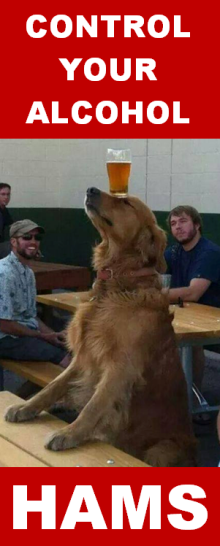- Find Ways To Relax
- Talk Back
- Surf The Urge
- Fight Insomnia
- Get Abs Meds
- Find Alternative Activities
- See A Therapist
- Use Cognitive Behavioral Tools
- Marijuana Maintenance
1. Find Ways To Relax:
A lot of people rely on alcohol as a way to relax after work and other times. When you do abs you will need to find a new way to do this. Some of the things which some of our members suggest are: a hot bath, yoga, exercise, meditation, and relaxation tapes.
2. Talk Back:
Stay conscious of your thoughts. When you start having thoughts run through your mind saying that it is okay to have a drink or need one, then talk back to them. Tell them, "Shut the F__ up!! I am not gonna drink if I don't want to and you can't make me!! So there!!"
3. Surf The Urge:
Cravings don't last forever, in fact they pass rather quickly. When the urge to drink hits you just sit back and observe it and see how quickly it passes. For more tips on dealing with urges visit our page on Urge Management.
4. Fight Insomnia:
A lot of people overdrink because of insomnia. Even if you did not suffer from insomnia before you started drinking heavily, you may find that you have it when you do abstinence. There are several over the counter medications which can help with insomnia including benedryl, melatonin, and valerian root. Exercise can also help with insomnia, and taking your vitamins can help too. Or you may wish to consult a doctor and get a prescription for a sleep aid such as ambien or lunesta. Most ways of getting to sleep are better than using alcohol to sleep--and will not leave you hungover in the morning.
5. Get Abs Meds:
Not everyone will choose to use medications to help them to abstain. However, some people have found medications a great aid to abstinence. There are several prescription medications on the market which are used to help people achieve and maintain abstinence. The most common are: antabuse, naltrexone, campral, and topamax. We deal with these in more detail on the page Medications For Alcohol Abstinence, here we just give a brief overview of each. Antabuse is the oldest and best known of these, Antabuse interferes with alcohol metabolism and makes people become very sick when they drink alcohol. Naltrexone is an opiate antagonist and interferes with getting a buzz from alcohol by blocking endorphin receptors. Campral is an anti-craving medication which operates on the GABA receptors in the brain and reduces or eliminates desire for alcohol. Topomax also interferes with the alcohol buzz by inhibiting dopamine receptors. If one is having a very hard time abstaining it may be worthwhile getting a prescription for one of these medications.
6. Find Alternative Activities:
The best way to abstain is to find activities which are incompatible with drinking and much more enjoyable. Take a class at a local college. Volunteer for a cause you believe in. Create a web site. Write a book. Paint. Knit. Anything which you truly love more than alcohol is a great way to abstain.
7. See A Therapist:
Some people drink too much in reaction to issues such as anxiety, depression, or simple live stress. People who suffer from depression or anxiety or other such issues may benefit from medications prescribed by a psychiatrist to treat them. People dealing with these issues or general life issues may also benefit from some form of talk therapy such as Cognitive Behavioral Therapy. If you feel a need for help by all means seek it out. If your therapist insists on sending you to a 12 step program instead of helping you then fire that therapist and find one who knows what he/she is doing.
8. Use Cognitive Behavioral Tools:
Learn not to "awfulize" of "catastrophize" negative events in your life. Doing so can leave you running for a drink. Always remember that you are the master of your own mind--you may not be able to control events around you but you can choose how you react to them. The SMART Recovery site has a lot of useful cognitive behavioral tools you can use.
9. Marijuana Maintenance:
Substituting cannabis for alcohol is not for everyone, but it works for some people. In particular people who have withdrawal symptoms when they drink and who are unwilling to abstain from all mood altering substances may find substituting cannabis to be their best bet. Marijuana is illegal--this is its biggest drawback. Some people may also find marijuana to be a trigger to drink--marijuana maintenance is not for everyone. For more information about marijuana maintenance please visit the HAMS web page Marijuana Maintenance - Cannabis Substitution for Alcohol Dependence. Tod Mikuriya's article Cannabis as a substitute for alcohol is also an excellent sourc of information on Marijuana Maintenance.



